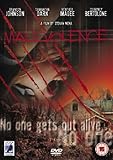Eye For Film >> Movies >> Malevolence (2005) Film Review
Some 10 years after a spate of unsolved disappearances in a rural area, four outsiders bungle a robbery at the local bank. One dies from gunshot wounds, but the dead man's sister Marylin (Heather Magee), her naive boyfriend Julian (Brandon Johnson) and the manipulative, violent Kurt (Richard Glover) flee to an abandoned farmhouse to take stock and split the money, with hostages Samantha (Samantha Dark) and her young daughter Courtney (Courtney Bertalone) in tow. It seems that the double-crossing felons are going to be their own worst enemy, but in the old slaughterhouse nearby lurks someone far more deadly from the region's past.
And so you have the unstoppable tool-wielding murderer, the hapless prey, the resourceful "final girl", the climactic unmasking and the sequel-begging coda. In the Seventies and Eighties, these essential genre elements were stripped down, cut up and ripped apart in every conceivable permutation, so that by the beginning of the Nineties the slasher was looking very tired indeed (perhaps, it was all that running about) and a long hiatus followed when teen co-eds could once again smoke dope and fornicate on-screen, with little fear of carnage ensuing. Then, in 1997, Wes Craven affectionately dissected the slasher movie with the postmodern parody of Scream and a genre, thought long dead, was miraculously revived.

The rest, as they say, is history, although perhaps in more ways than one. For when it comes to the slasher genre, there is no doubting we live in a belated era, doomed, like some hapless victim fleeing for her life, to keep looking back to the source of terror. And these days, it is always the past that returns to stalk us, whether in glossy retoolings of slice-and-dice classics (The Texas Chainsaw Massacre, The Toolbox Murders), or in genre-savvy homages to the Seventies (House Of 1000 Corpses, Cabin Fever, Switchblade Romance). Stevan Mena's low-budget debut Malevolence definitely falls into the latter category, for while it is an all-new script, it blatantly retraces killing grounds so old and familiar that at times it seems little more than a fan boy's compendium of favourite moments from the last half century's worth of slash-and-dash mayhem.
To begin with, there is a basic storyline - fugitive criminals stumble upon an isolated hideout where something far more dangerous than the law awaits them - whose origins can be traced through From Dusk Till Dawn (1996) and Dead Birds (2004) to the granddaddy of them all, Alfred Hitchcock's Psycho (1960). Yet Mena fails to exploit the generic disjunction in this sort of narrative arc. Where the films that have inspired him ease viewers into thinking they are merely watching some kind of heist thriller, before sneaking up from behind with far more horrific material, Malevolence gives the whole game away right from the start, with a prologue, set a decade before the main events, in which an abducted boy is forced to watch a bound woman being menaced and then butchered in an old slaughterhouse. In his determination to establish backstory, Mena has missed a trick here, for after an opening like that, nobody is likely to be surprised that his incompetent bank robbers are headed for a deathtrap.
Once the killing starts, the film is brimful of respectful references to Halloween, the Friday the 13th sequels and any of the countless other films that feature masked villains breathing heavily, saying nothing and refusing to die. It is all competently directed and there is a queasily pleasing synthesised soundtrack by Mena himself, some well-handled tension and a perfectly creepy location in the slaughterhouse itself. But for my money, the characterisation, such as it is, never adds much to the plotting. There is a little too much aimless racing about and the performances are merely bland, rather than bad (in a genre where bad acting is not always unwelcome).
Even if the later scenes carry some clumsy exposition, apparently designed more to set up the projected sequel and prequel than to keep the viewer entertained, it is here, at least, that the film most firmly establishes its own position in the history of the slasher genre. For if Scream was all about a generation that has grown up deconstructing videos of Halloween (1978), Malevolence is more concerned with a much younger generation forced to watch something akin to the horrors of the original The Texas Chainsaw Massacre (1974) and the harrowing effect that it has had on their subsequent psychological development.
And let's face it, that mind, scarred beyond all repair, belongs to you, me and anyone else who sat with manic glee through Tobe Hooper's entire Seventies oeuvre.
Reviewed on: 12 Oct 2005



















